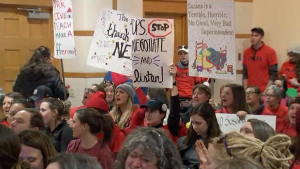Denver Classroom Teachers Association Organizing
The DCTA has addressed issues of pay and funding by sending memos, striking, mobilizing, and advocating for institutional changes. A major educational organizing strategy used by the DCTA is collective bargaining and striking during negotiations with the Denver School Board.

DPS, DCTA hopeful to reach agreement on third day of teacher strike. The Denver Channel. (2019).
The issue of pay and value directly correlates to how funding inequalities make it incredibly difficult to be a highly effective educator. The DCTA has conducted numerous walkouts, strikes, picketing lines for increased wages. Overall, their work has been extremely effective. In February 2018, the DCTA union won pay raises after their 3-day strike. Also, they have organized around larger organizing for fairer pay for educators.
On social media, they gather behind the #REDforED movement, which started in West Virginia and now is a national bipartisan educational reform movement (Blanc, 2020). They state how low teacher pay reflects larger funding inequalities in the system. To amend both, DCTA highlights the need to look at the basis of unequal funding, and create systematic changes to repair Denver communities and children. Similarly, they have worked within the system to create change. During the previous election cycle, their voting recommendations emphasized a need to repeal the Gallagher Amendment, and also pass more specific funding policies for education.

DCTA Town Hall on State Funding. Facebook, Denver Classroom Teachers Association. (2020).
On their Facebook account, the Denver Classrooms Teachers Association has also held and posted a town hall they had, in which they talked to local law-makers, encouraging them to stop education funding cuts and rethink tax formulas to better incorporate the needs of students. Their activism for the repeal of the Gallagher Amendment also proved helpful, with the win in the 2020 election.
Caucus of Today’s Teachers Organizing

Todays Teachers. (2020).
The Caucus of Today’s Teachers emerged to organize against and push DCTA beyond their personal tribulations to fight more for social justice. Because the CTT came from the DCTA, its members have engaged in many of the larger union efforts. However, I believe the Today’s Teachers Caucus also does a good job of reaching out to different parts of the Denver community to build and gather input on what the role of education should be, and how to achieve that. According to their website, members are currently organizing a community book club, along with a documentary watch party surrounding equity and racism. The CTT has also aligned themselves with UCORE, United Caucus of Rank and File Educators. This has allowed the CTT to incorporate positive organizing strategies that UCORE have discovered, and collaborate with their members (Today’s Teachers, 2020).
Major Organizing Challenges
A mobilizing challenge for both the DCTA and the CTT is to function within the existing laws, strained economic resources, and manage each other. Laws, such as the Gallagher Amendment, have made it extremely difficult to organize and create this high-level institutional change. Tax laws also limit funding allocated towards education, with legislators liberally cutting education budgets (Goodland, 2020). Especially for the DCTA, the school board has been a major hurdle in negotiations regarding demands and school budgets.

Social Justice begins with me. Grand Valley State University. (2020).
The most notable obstacle though is themselves. The Caucus believes that DCTA is not doing enough to advocate for social justice issues, creating internal conflict in the role of the DCTA overall. The DCTA has had great success in advocating for teachers, but the Caucus would argue that they are missing out on properly advocating for students as much as they should.
